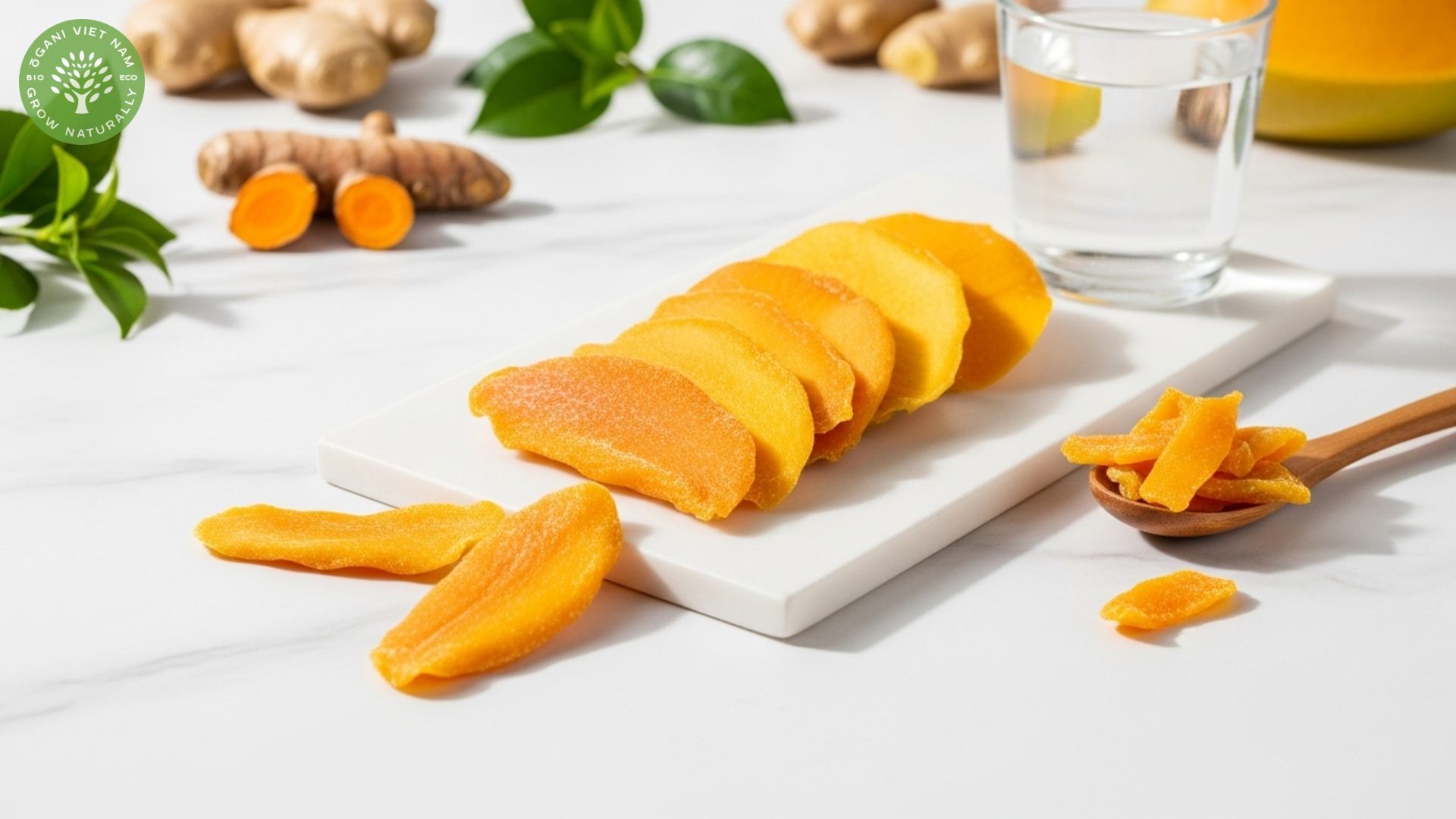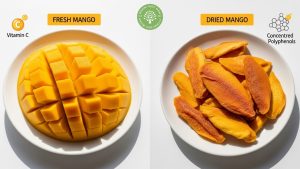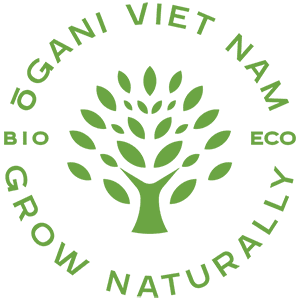
Is dried mango anti inflammatory? Yes, dried mango contains potent anti-inflammatory compounds including mangiferin, polyphenols, and vitamin C that can help reduce inflammation markers in your body. At Ogani VN, we’ve researched extensively to bring you the complete truth about dried mango’s therapeutic properties.
While fresh mangoes get most of the attention, dried mangoes concentrate many of these beneficial compounds, making them a convenient and effective way to incorporate anti-inflammatory nutrients into your daily routine. However, the processing method and added sugars can impact their overall health benefits.
Is dried mango anti inflammatory? Understanding the active compounds
Dried mangoes are nutritional powerhouses packed with bioactive compounds that specifically target inflammation pathways in your body. The star player here is mangiferin, a unique xanthonoid that gives mango its distinctive anti-inflammatory properties.
When mangoes undergo the drying process, water content decreases from about 85% to 15-20%, which means the concentration of beneficial compounds like polyphenols, carotenoids, and vitamin C increases significantly per gram. This concentration effect makes dried mango anti inflammatory properties more potent than you might expect.
Research published in the Journal of Nutritional Science shows that mangiferin can inhibit several inflammatory markers including tumor necrosis factor-alpha (TNF-α) and interleukin-6 (IL-6). These are the same inflammatory markers linked to chronic diseases like arthritis, heart disease, and metabolic disorders.
The antioxidant activity in dried mangoes comes from a synergistic blend of compounds working together. Beta-carotene converts to vitamin A in your body, supporting immune function and reducing oxidative stress. Meanwhile, quercetin and gallic acid provide additional anti-inflammatory support by neutralizing free radicals that trigger inflammatory responses.
Is dried mango anti inflammatory according to science?
Multiple clinical studies have investigated mango consumption and its effects on inflammatory markers, providing concrete evidence for dried mango’s therapeutic potential. A 2023 study published in PMC examined how two weeks of mango ingestion affected post-exercise inflammation in healthy adults.
The research revealed that participants who consumed mango showed reduced levels of C-reactive protein (CRP), a key inflammation marker measured in blood tests. More importantly, the anti-inflammatory effects persisted even after intense physical exercise, suggesting that dried mango anti inflammatory compounds provide sustained protection.
Another significant study from 2017 tracked obese individuals consuming freeze-dried mango for 12 weeks. While the study noted no dramatic changes in obesity-related inflammation, researchers observed positive trends in antioxidant capacity and metabolic markers. This suggests that dried mango works best as part of a comprehensive anti-inflammatory lifestyle approach.
What makes these findings particularly relevant is that dried mango retains most of the bioactive compounds found in fresh fruit. The dehydration process concentrates polyphenols like gallotannins and anthocyanins, which directly modulate inflammatory pathways in your digestive system and bloodstream.
Recent vascular health research has shown that mango consumption can decrease inflammation activity within arterial walls. The antioxidant compounds appear to protect the endothelium (inner lining of blood vessels) from inflammatory damage, potentially reducing cardiovascular disease risk.
Is dried mango anti inflammatory compared to fresh mango?
The debate between fresh and dried mango often centers on nutritional density and bioavailability of anti-inflammatory compounds. Fresh mangoes contain higher water content and vitamin C levels, but dried mangoes offer concentrated polyphenols and longer shelf stability.
Nutrient concentration differences

Dried mangoes contain approximately 3-4 times more concentrated antioxidants per serving compared to fresh fruit. This concentration effect means you’re getting more mangiferin, quercetin, and gallic acid in a smaller portion size. However, the drying process can reduce heat-sensitive nutrients like vitamin C by 20-30%.
For inflammation management, both forms provide benefits, but dried mango offers convenience and consistent potency year-round. The concentrated dried mango anti inflammatory compounds make it easier to achieve therapeutic doses without consuming large quantities of fresh fruit.
Processing method impact
The method used to dry mangoes significantly affects their anti-inflammatory potential. Freeze-dried mangoes retain the highest levels of bioactive compounds, while sun-dried or heat-processed varieties may lose some beneficial properties. At Ogani VN, we recommend looking for minimally processed dried mangoes without added sulfites or excessive sugars.
Organic dried mangoes typically contain higher polyphenol levels because they’re grown without synthetic pesticides that can interfere with the plant’s natural antioxidant production. This translates to enhanced anti-inflammatory effects when consumed regularly.
How much dried mango is anti inflammatory for daily consumption?
Getting the maximum anti-inflammatory benefits from dried mango requires understanding proper dosing and timing. Many people ask is dried mango anti inflammatory enough to make a real difference, and research suggests that consistent, moderate consumption provides better results than sporadic large doses.
The effective dosage for anti-inflammatory effects appears to be around 100-150 grams of dried mango per day, equivalent to roughly 1/2 to 3/4 cup. This provides approximately 200-300mg of combined polyphenols, including 50-75mg of mangiferin – the levels shown to be effective in clinical studies when people wonder is dried mango anti inflammatory.
For best absorption of dried mango anti inflammatory compounds, consume them with a small amount of healthy fat like nuts or seeds. The fat-soluble carotenoids and some polyphenols require lipids for optimal bioavailability.
Timing matters too. Consuming dried mango 30-60 minutes before meals can help prepare your digestive system to better absorb the anti-inflammatory compounds. The natural fiber also helps slow sugar absorption, preventing inflammatory blood sugar spikes that could counteract the question of whether is dried mango anti inflammatory.
Potential interactions and precautions
While dried mango is generally safe for most people, those taking blood-thinning medications should consult their healthcare provider. The high vitamin K content and natural salicylates can potentially interact with anticoagulant drugs.
Diabetics should monitor their blood sugar response, as dried fruits naturally concentrate sugars. However, the fiber and polyphenols in quality dried mango can actually help moderate glycemic response compared to processed sweets.
Maximizing anti-inflammatory benefits through proper selection
Not all dried mangoes offer equal anti-inflammatory potential. The variety of mango, processing method, storage conditions, and added ingredients all impact the therapeutic value of your final product.
Choosing high-quality dried mango

Look for dried mangoes that maintain their natural orange color without artificial brighteners. Quality products should list only mango as the ingredient, without added sugars, sulfites, or preservatives that can counteract anti-inflammatory benefits.
The texture should be chewy but not overly hard or sticky. Properly dried mangoes retain some moisture while concentrating nutrients. Avoid products that appear too dry or have crystallized sugar coating, as these indicate over-processing or added sweeteners.
Dried mango anti inflammatory properties are best preserved in products stored in airtight, light-protected packaging. UV exposure can degrade sensitive polyphenols, reducing the therapeutic potential of your dried fruit.
Storage and preparation tips
Store opened dried mango in airtight containers away from heat and light to preserve bioactive compounds. Properly stored dried mango maintains its anti-inflammatory properties for 6-12 months.
Consider rehydrating dried mango in warm water for 10-15 minutes before consumption. This can improve digestibility and may enhance the bioavailability of certain compounds. The soaking liquid contains dissolved nutrients and shouldn’t be discarded.
Frequently Asked Questions
How much dried mango should I eat daily for anti-inflammatory benefits? Aim for 1/2 to 3/4 cup (100-150g) of unsweetened dried mango daily. This provides therapeutic levels of mangiferin and polyphenols while avoiding excessive sugar intake.
Can dried mango help with arthritis pain? Yes, the mangiferin and polyphenols in dried mango can help reduce inflammatory markers associated with arthritis. However, it works best as part of a comprehensive anti-inflammatory diet rather than a standalone treatment.
Is dried mango better than taking anti-inflammatory supplements? Dried mango provides a whole food source of multiple anti-inflammatory compounds working synergistically. While supplements may offer higher concentrations of single compounds, the natural combination in dried mango often provides better overall benefits.
Does the sugar in dried mango counteract its anti-inflammatory effects? Quality dried mango without added sugars contains natural fruit sugars balanced by fiber and polyphenols that help moderate blood sugar response. The anti-inflammatory benefits typically outweigh concerns about natural sugar content when consumed in moderation.
How long does it take to see anti-inflammatory effects from eating dried mango? Some people notice reduced inflammation markers within 2-3 weeks of consistent consumption, though individual responses vary based on overall diet, health status, and inflammation levels.
Start your anti-inflammatory journey with dried mango today
Is dried mango anti inflammatory? Absolutely. The concentrated polyphenols, mangiferin, and antioxidants in quality dried mango provide significant anti-inflammatory benefits that can support your overall health and wellness journey.
At Ogani VN, we believe in the power of natural, whole foods to support your body’s healing processes. Dried mango offers a convenient, delicious way to incorporate proven anti-inflammatory compounds into your daily routine. Choose high-quality, unsweetened varieties and consume them consistently as part of a balanced, anti-inflammatory lifestyle.
Ready to experience the anti-inflammatory benefits of premium dried mango? Browse our selection of organic, minimally processed dried fruits and start your journey toward reduced inflammation and better health today. Your body will thank you for choosing natural, effective nutrition that actually works.
Read more:
- Dried Mango Nutrition Facts: Complete Guide To Calories, Benefits & Health Impact
- Best Dried Mango No Sugar Added: Premium Quality Guide
- Calories In Dried Mango No Sugar Added: Complete Nutrition Guide
- Dried Mango Nutritional Value: Complete Health Guide
- Is Dried Mango Anti Inflammatory? Complete Health Guide

